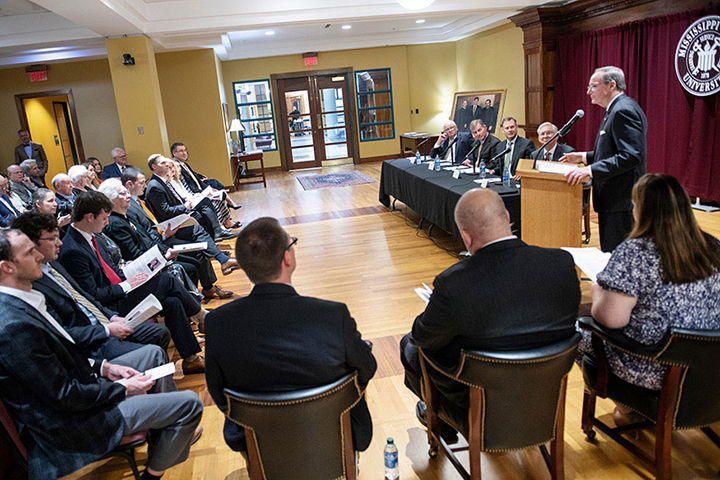Pickerings champion bipartisanship, civility during dedication of papers

President Mark E. Keenum speaks during a dedication and opening of the political papers of Judge Charles W. Pickering Sr. and Congressman Charles W. “Chip” Pickering Jr. PHOTO: Megan Bean | Public Affairs
Two exalted figures in Mississippi politics called for Americans to sit down with each other, have difficult-but-civil conversations and work to better the nation as Mississippi State officials formally celebrated the dedication and opening of their political papers now housed at the university.
The father-and-son duo -- Judge Charles W. Pickering Sr. and Congressman Charles W. “Chip” Pickering Jr. -- were part of a Friday [March 31] panel discussion held at Mitchell Memorial Library, where the Mississippi Political Collections unit now hosts documents from the public service of the former federal judge and the former representative of Mississippi’s 3rd Congressional District.
The panel, which included former MSU President Malcolm Portera and longtime Mississippi Republican Party strategist Henry Barbour, discussed various past and present political topics affecting both the state and nation, from the Republican schism of 1976 that led to President Gerald Ford securing his party’s nomination but failing to win the year’s general election to the Pickering family’s relationship with former U.S. Supreme Court Associate Justice Antonin Scalia.
When asked about the current state of Washington, D.C., both Pickerings, who were noted throughout their careers for being able to reach across the aisle and work with people of various political leanings, urged current leaders to find common ground so they can deliver the best results for the country.
Congressman Pickering said his experience as a staffer for former Senate Majority Leader Trent Lott during former President Bill Clinton’s administration helped him and others learn how to make deals in “the last tremendous burst of bipartisan achievement.”
“If we can ever restore a common purpose, common mission, common language, common value system -- at least in the best degree we can -- that’s our only hope to restore civility,” the junior Pickering said. “What I hope is we can go back to what we know works: sitting in the room with people that are different than yourself, from different places and with different beliefs, and sitting there until we find common ground. I got to live it, and I am so grateful that I got to live that experience.”
Building on his son’s call for restoring bipartisan efforts, Judge Pickering called on Americans to restore respect for law and order, strengthen the country’s morals and work in education to ensure children know right from wrong.
“We’ve lost our moral moorings,” the elder Pickering said. “People say faith didn’t make a difference [in the founding and subsequent success of America], but it did.”
David Nolen, associate dean for MSU Libraries’ Archives and Special Collections, which houses the MPC, said the addition of the Pickerings’ papers enrich MSU’s “already-strong holdings” and make the university a “vital resource in the study of the Mississippi political landscape.”
The collection adds valuable records to the national and state political history reflected in the MPC’s archives. Judge Pickering’s papers add to a robust network of collections that explore the rise of the modern Mississippi Republican Party, including the official papers of the state’s GOP and several other 20th century figures. His papers also help expand the MPC’s quickly growing holding of judicial papers and collections, an essential element of Mississippi’s justice system history and public service.
Congressman Pickering’s papers continue the story of Mississippi’s 3rd Congressional District as Pickering succeeded Congressman G.V. “Sonny” Montgomery’s legendary 30-year career in Congress. Congressman Pickering’s own 12-year career spotlights a part of early 21st century politics not yet explored in other open collections at the MPC, covering such crucial subjects as the 9/11 attacks, early days of the wars in Afghanistan and Iraq, 2000 presidential election, George W. Bush administration, Hurricane Katrina and much more. Congressman Pickering’s committee work and his contributions to telecommunications policy reflect a career focused on ensuring rural areas of the nation, including Mississippi, have access to broadband and other high-speed information technology needed to bolster the state's educational goals and workforce.
“The MPC can now trace the history of the 3rd Congressional District from Sonny Montgomery to the 21st century, thanks to donations by Congressman Pickering and former Congressman Gregg Harper,” Nolen said.
All finding aids for MPC collections and those of the remaining units of Archives and Special Collections, as well as the Ulysses S. Grant Presidential Library and the Frank and Virginia Williams Collection of Lincolniana, can be searched at https://msstate-archives.libraryhost.com.
For more information about MSU Libraries, visit www.library.msstate.edu.
MSU is Mississippi’s leading university, available online at www.msstate.edu.
Carl Smith | Public Affairs



